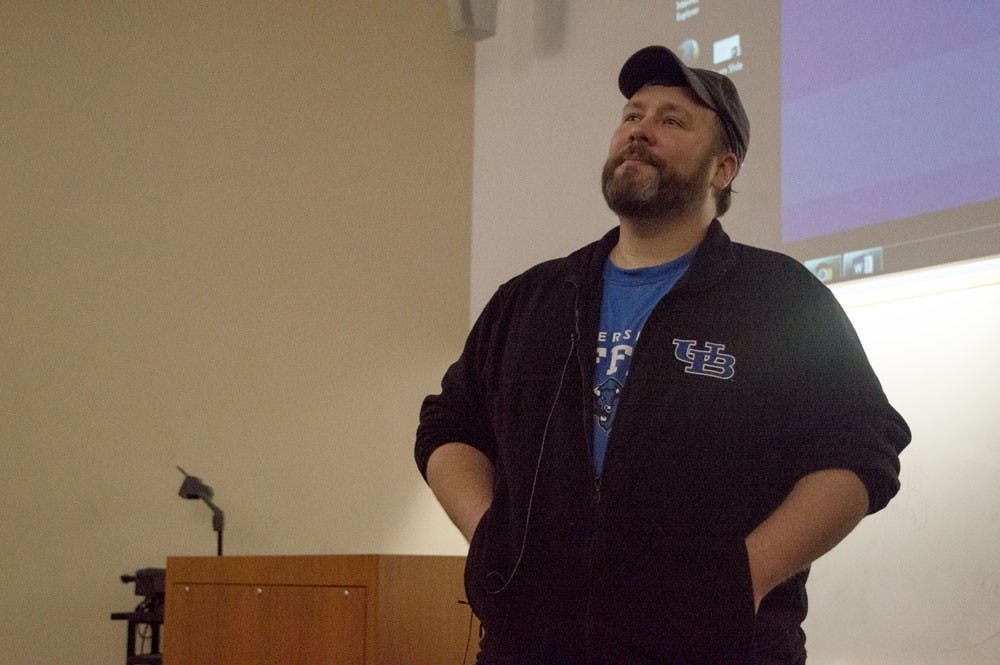Students spend more than three months studying, reading and practicing material hoping to receive that at times elusive ‘A.’ But often times a single final exam accounts for the majority of their grade.
“There should be more than just a midterm and a final exam administered,” said Olivia DeMian, a senior communication major. “I’m not a great test taker, neither are my friends, it feels unfair when I am pressured with only two to four opportunities to be graded.”
Students often have grievances about how professors decide to calculate their final grade and the dreaded finals week, which runs from Dec. 14 until Dec. 21 this semester, as a whole. Professors across different departments have their own methods for breaking down students’ grades, and some even adjust their class structure to fit student preferences.
Lance Rintamaki, an associate communication professor, has taught communication courses at UB for more than a decade. He is used to students’ constant criticisms of final exams, which is why he leaves the grading structure up to them.
“I use a developmental, rather than punitive, grading system,” Rintamaki said. “With a punitive grading style, once a student makes a mistake [like failing a test], they lose points forever from their grade, often without a means of recouping them later.”
Instead, Rintamaki has seen much better results by providing students with an optional grading system.
Although he still administers four non-cumulative exams to assess what a student currently knows, his optional grading system gives students the opportunity to reconsider where they went wrong and fix it through optional essays, projects and a cumulative optional final that will replace the average exam score if it’s higher than the previous average.
“If you get an A on the final, you get an A in the class,” he said.
But this method of grading may only work for certain course material.
Many professors believe that grading structure should be reflected by the content in which the class is trying to convey to its students.
Muriel T. Anderson, a clinical associate professor in the School of Management, administers a midterm and a final exam but also requires the completion of a weekly quiz.
“I require weekly quizzes primarily to help keep students on top of material,” Anderson said. “The nature of accounting is that it is like learning a new language so it is important to keep practicing.”
While this is not a popular grading structure among students, some believe it is necessary because it actually requires students to go back and recite things they may have learned the first day of classes.
“I think finals are a good way to [finish] a class because they cover most of the important information,” said Steve Nesler, a business administration major. “They are a pain but they force you to know everything.”
But not all professors put as much weight on final exams.
Bina Ramamurthy, an associate professor in the Computer Science and Engineering Department, said student assessment involves three components for specific reasons.
Ramamurthy gives students 20-question online quizzes that review the course material and prepares students for finals exams. She said this is to provide students with immediate feeback.
She also gives students three written exams that take 50 minutes to complete. This is to be sure students are able to “problem-solve and communicate.”
Lastly, her students are required to complete five labs throughout the semester where they apply skills and concepts learned in class. Through the labs, students have to design and implement software.
Zachary Carr, a PhD communication student, just completed his first semester teaching a 200-level class on research methods. He’s using his knowledge as a former undergraduate student to make his classes easier while also completely encompassing all the material required.
“I believe that exams and quizzes are not the only means of evaluate what a student has learned,” Carr said. “The content of research methods requires some extent of memorization and of certain terms and such, thus why I have exams.”
Along with two exams, Carr also administers a project that is completed in four phases across the entire semester as well as two open-note quizzes that are completed a week before each exam.
He believes this helps embed the information into student’s brains resulting in better exam scores.
“The research project that I use then allows each student to gain real life knowledge of how research is carried out,” Carr said. “In my opinion, [the research project] truly evaluates if students understood the content pertaining to research methods.”
One student has an idea to eliminate the stresses final exams come with.
“I think teachers should allow cheat sheets,” said Alex McGannon, a business major. “In what world are you not allowed to look at information and then have to make assumptions and answer questions about it. It teaches you to apply instead of memorize.”
Evan Schneider is a news staff writer and can be reached at news@ubspectrum.com





